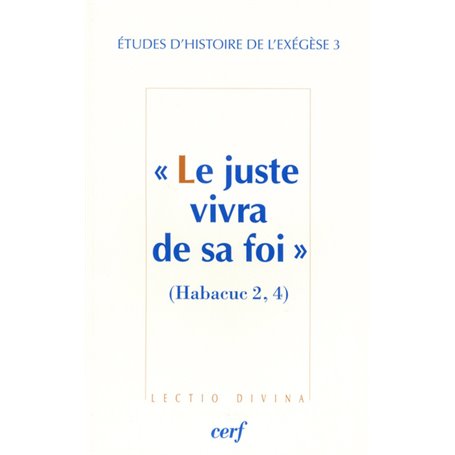Le Juste vivra de sa foi
Format BrochéAuteur :

Livraison en Guyane tout compris

Retours et SAV simplifiés

Garantie Isleden
Description
Tant dans la tradition juive que dans la tradition chrétienne, le verset d'Habacuc 2, 4, " Le juste vivra de sa foi ", est célèbre et constamment cité. Son utilisation dans les épîtres pauliniennes confirme d'ailleurs son importance. Du côté chrétien, il vient appuyer les réflexions sur la justification par la foi du côté juif, tout en permettant de souligner le rôle fondamental de la foi (" emunah "), il pose le rapport de celle-ci avec la Loi. Cinq étapes de l'histoire de son exégèse sont ici étudiées, depuis la tradition herméneutique du judaïsme ancien jusqu'à l'attention que porte l'exégèse juive contemporaine à l'importance des uvres, en passant par les Pères grecs et latins, les commentateurs chrétiens du Moyen Âge et enfin Luther et Calvin. Ce parcours impressionnant montre la richesse du verset et l'impact qu'il a eu dans les différentes traditions d'interprétation. Ce volume est issu de la troisième des " journées bibliques " organisées par le Laboratoire d'études des monothéismes/Institut d'études augustiniennes (CNRS-EPHE Sciences religieuses-Paris IV) et le Groupe de recherches sur les non-conformistes religieux des XVIe et XVIIe siècles et l'histoire des protestantismes (GRENEP, faculté de théologie protestante de l'université de Strasbourg). Il fait partie d'une série consacrée à l'histoire de l'exégèse de la Bible. -- Habakkuk 2, 4: 'The righteous will live by their faith' - is just as well-known and often quoted in the Jewish tradition as in the Christian. Its use in Paul's epistles confirms its significance. From the Christian viewpoint, it strengthens reflections on justification by faith from the Jewish viewpoint, not only does it underline the fundamental role of faith ('emunah'), it also defines the relation between faith and the Law. In this book, five stages in the history of the exegesis of this verse are studied from ancient Jewish hermeneutic tradition to the attention contemporary Jewish exegesis gives to the importance of works, taking in the Greek and Latin Fathers, the medieval commentators and finally Luther and Calvin. This impressive itinerary shows the richness of this verse and the impact it has had on different traditions of interpretation. This book is the fruit of the third 'Bible Day' organized by the Laboratoire d'études des monothéismes/Institut d'études augustiniennes (CNRS-EPHE Sciences religieuses-Paris IV) and the Research Group on religious non-conformists of the 16th and 17th centuries and the history of Protestantism (GRENEP, Protestant theology dept. of the University of Strasbourg). It is one of a series devoted to the history of Biblical exegesis.
Caractéristiques
Caractéristiques
- Format
- Broché
- Collection
- Lectio divina
- Date de parution
- 12/01/2012



